Standard Chartered (L:STAN) reported a massive yearly loss for 2015, the bank’s first in almost thirty years. The results were so bad that the company has publicly stated it might even “claw back” bonuses from about 140 executives. If the firm is truly interested in assigning blame, however, it might first look to Ben Bernanke and Janet Yellen (as primary representatives of the international central banking cabal of economists). Perhaps more so than any other bank, save Morgan Stanley (N:MS), Standard Chartered was the epitome of following the global recovery story; literally placing the institution’s money where Yellen declared.
Standard Chartered, an Asia-focused bank based in London, reported on Tuesday an unexpectedly large loss of $2.36 billion for 2015 after being pummeled by its exposure to emerging markets and bad loans.
The word that clearly doesn’t belong in that paragraph above is “unexpectedly.” If you still believe that the world is on the right track (even though it has been deviated in “transitory” fashion by the “strong dollar”) then this doesn’t make much sense. But Standard Chartered, like Deutsche Bank (DE:DBKGn), Credit Suisse (VX:CSGN) and Goldman Sachs (N:GS), sits at the extremely important nexus between the structural problems of the eurodollar standard as it careens faster toward its exit and the more recent “cyclical” nature of the acceleration. In other words, the losses are picking up pace and magnitude but that is no surprise at all, only the amplification of the same trend in place since August 2007 (reborn in 2011).
Just last year, Standard went through a management shakeup that conspicuously occurred at the very same time as several other banks that similarly shared its orthodox enthusiasm. Pieced together, the idea was clear – management teams that had pushed the FICC envelope even after the 2013 “warning” were fired in the middle of 2015 because it was then that what was coming (losses and more) became frighteningly evident. I wrote last June:
There are other management departures around the global banking community as well as serious realignments much more quietly being implemented. Standard Chartered’s CEO and the head of its Asian unit resigned in late February due to “unrest” at that global bank, traced to poor banking performance in India. The big business of big global banking does not seem so glamorous in 2015 particularly in comparison to a decade ago. These titans were everything then, and their rearrangements now, at this particular moment, are poignant.
To an economist in the Yellen bubble, that was all just unrelated or idiosyncratic maneuvering that is typical for banks or any business in any environment. Banks make bad trades as any investors do, and sometimes there are repercussions. But such a view of the trees misses the great forest:
Investors are running out of patience with European bank chieftains, and no wonder. Since the fall of Lehman Brothers in September 2008, eight of Europe’s biggest banks have announced layoffs adding up to about 100,000 employees, paid $63 billion in legal penalties, and lost $420 billion in market value. In 2015, Deutsche Bank lost a record €6.8 billion ($7.6 billion). In mid-February the industry suffered an epic selloff as subzero interest rates, China’s slowdown, the oil crash, and looming regulatory and litigation costs triggered an outbreak of fear not seen since the fall of 2008. Just last year new CEOs took over at Barclays (L:BARC), Credit Suisse, Deutsche Bank, and Standard Chartered.
As usual, even staring straight at the problem, the media cannot grasp the concept; that paragraph was immediately followed by the usual pabulum about “regulations.” As noted over and over, regulations have been no impediment to these rogue banks as they sought what they believed great opportunity in QE and monetarism actually paying off. They are not now being destroyed by regulatory inefficiency, rather the fact that there is no profit left in being a global eurodollar/wholesale bank.
The signs of this struggle are everywhere as are the absurdities that are offered to explain the symptoms of the eurodollar decay (including very basic indications of upset in money markets). The Office of Comptroller of the Currency issues a quarterly derivatives summary that tabulates from domestic bank call sheets reported exposures from any number of angles. The latest update in December for Q3 was more of the same reductions: total gross notionals declined by 2.9% from Q2, and 19.7% from Q3 2014, this “rising dollar.” Gross notional interest rate swaps fell to $147.8 trillion, which is $45 trillion or 24% less than the Q4 2010 peak.
The OCC has finally noticed compression trading as the vehicle to accomplish this reducing behavior, but again they offer an absurdity in order to preserve some kind of benign interpretation as if shrinking banks were always the norm. Efficiency is one thing, what is taking place in global banking is something altogether more fundamental.
The general decline in notionals since 2011 has resulted from trade compression efforts, as well as the lower volatility environment, which has led to less need for risk management products.
If you actually look at the OCC figures more recently, that statement holds no meaning. With particularly IR swaps the subject of compression trading, it doesn’t explain why there has been a sharp increase in compression trading during this “rising dollar” period that has “somehow” led to the negative swap spreads all over the curve and, apparently coincidentally, enormous global liquidations.
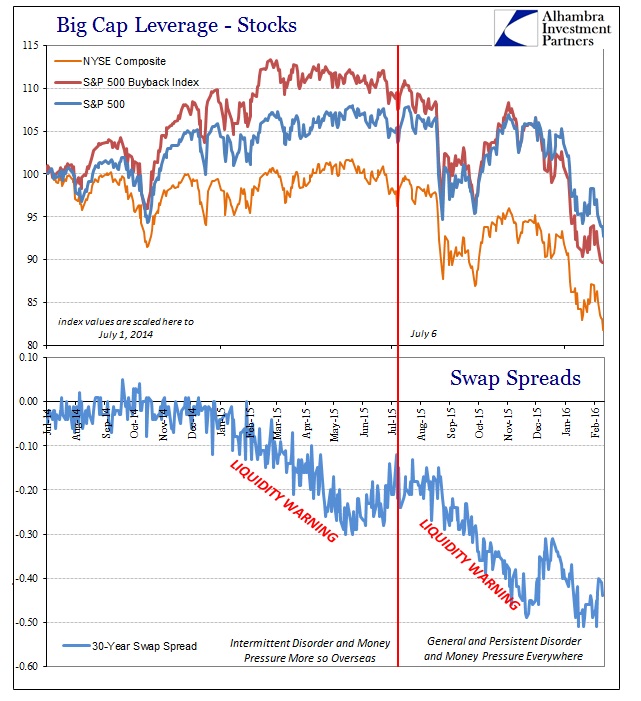
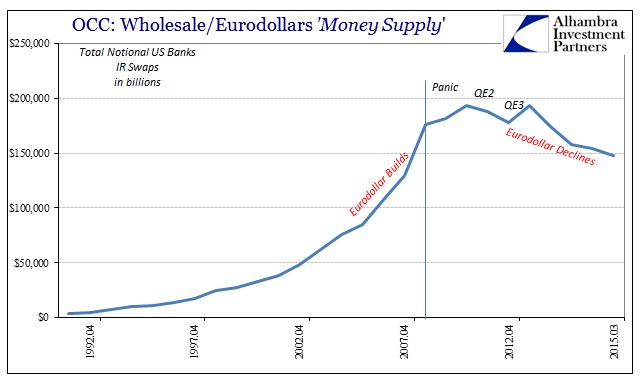
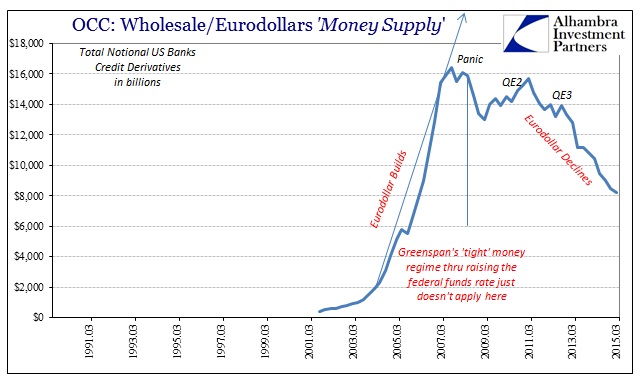
Further, the OCC reports for domestic US banking match almost perfectly the BIS estimates (through last June) for global banking across currencies (but still mainly the “dollar”).
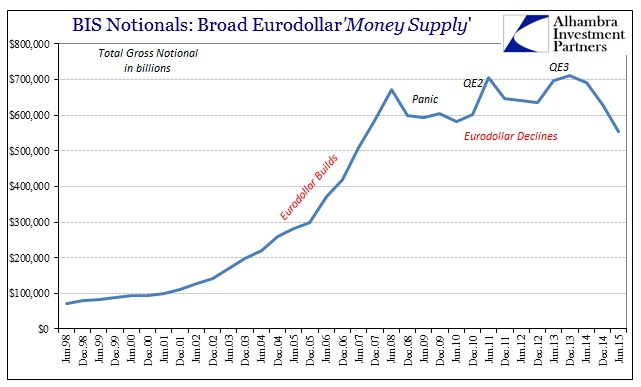
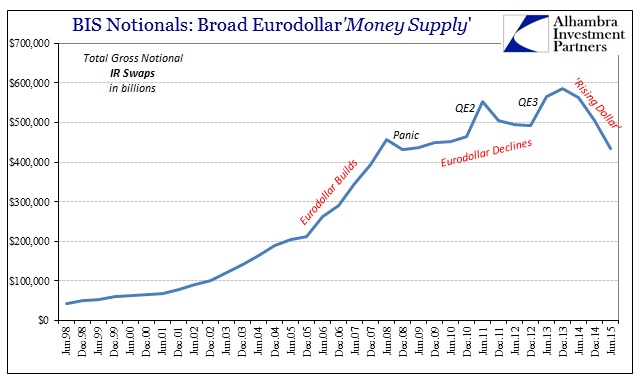
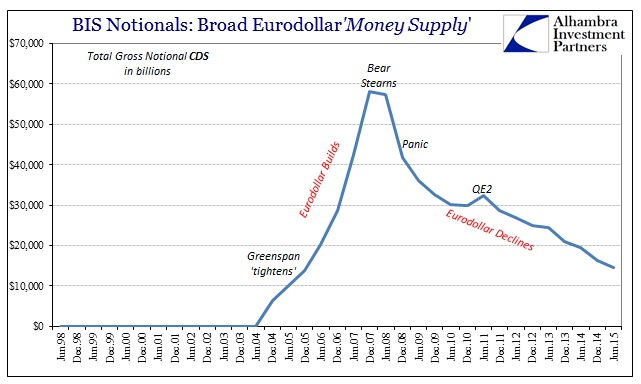
And so if we go back to the OCC’s benign explanation of compression trading and “lower volatility environment” we see that neither makes any sense. Why are banks suddenly increasing their compression submissions when they should be actively replacing old trades with exponentially more new and profitable versions? The “low volatility environment” certainly no longer applies to this “rising dollar” period, particularly in the eight months or so since last July (and much longer for overseas banking concerns). If that were a true summation of global banking incentives, then derivative books would be exploding right now in growth reminiscent of the pre-crisis era. I still have trouble believing the OCC actually wrote “less need for risk management products” in December 2015, such is the ridiculousness of the excuse.
That comparison obliterates the entire idea; the housing bubble period, in particular, was also a “low volatility environment”, in fact extremely low. It wasn’t until the panic period that everything reversed and thus making a mockery of this attempt to dismiss universal banking reduction as something other than a destabilizing paradigm shift. In short, neither compression trades nor volatility have anything to do with this almost surreal governing dynamic.
Stepping outside of purely derivatives delivers the fatal blow to “unexpected.” While we wait for the bulk of global eurodollar banks to report their annual filings, Goldman Sachs has already provided theirs. From it we can see this reductionism is not limited to derivatives or interest rate swaps at all, but rather that compression trading and shrinking derivative books are just extensions of this paradigm change.
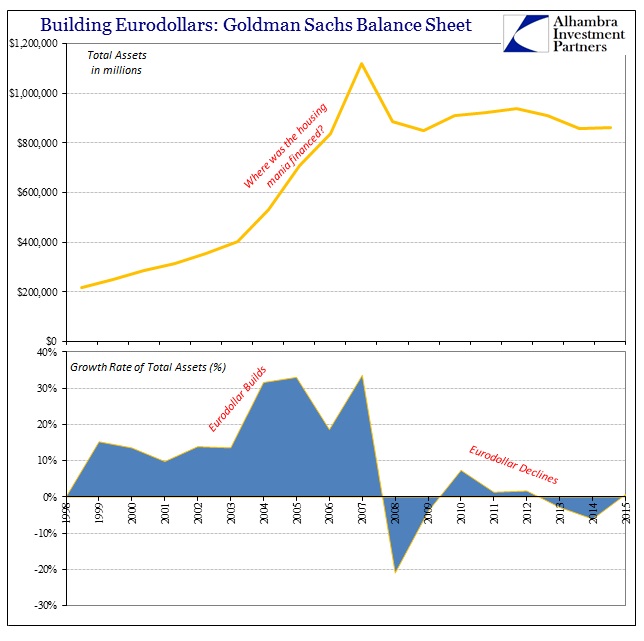
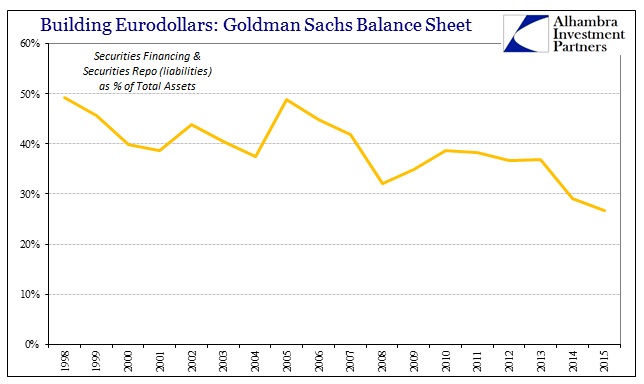
Goldman Sachs is smaller at the end of 2015 than it was in 2012 and significantly reduced from both its 2007 peak and more importantly the trajectory of growth projected by the eurodollar’s ascension that was once taken as the global economic and financial baseline. That is perhaps the most important point in all of this; that profitability in all these kinds of eurodollar and wholesale activities was in large part predicated on it growing steadily forever and never ending – an impossibility, of course, but the math was all there and pointing in that direction.
That was the nature of global banking before August 2007; bigger, bigger and more bigger. Expansion or die. Now the biggest banks still chasing prior glory are those at the front of the line for renewed slaughter. The eurodollar system is no longer viable because the ways and means upon which it was built, these geometric progressions, were never sustainable or stable. If your “money dealing” profits depend upon exponential growth and can maybe tolerate temporary deviation from that baseline (with some TBTF aid), then the events of 2011demonstrated not just renewed crisis but in fact a broken baseline that was actually irreparable. Regulations have very little to do with this central point.
If the eurodollar system were to be replaced it might stand a better chance of transformation with something already standing ready to be that replacement. Money funds might well be fine in a limited role of strictly money dealing, but wholesale banking is far more than that including an entire suite of risk transformations and conduits for traded liabilities. Increasingly, banks themselves are telling the world that those vital activities are no longer profitable and they just don’t want to undertake the risks and efforts to carry them out anymore. If not them, who?
As it is, central bankers seem totally unaware of the necessity, as evidenced by their continued and now public puzzlement over global liquidity and treasury volatility. Connecting the dots has never been their strong suit, making this transformation all the more potentially disruptive. The eurodollar standard was these banks, and now these banks increasingly no longer want it.
Actually, I think what I wrote last June is understating the degree of difficulty; it’s not just that eurodollar banks “no longer want it” it’s that without the possibility of restoring pre-crisis conditions, geometric growth, pursuing the same thinking and efforts is actually dangerous. If the eurodollar system was constructed on high risk with very, very high reward, the current shriveled husk is no reward, all risk. That might be the perfect summation for this structural transformation. In 2016, global banks having attained none of the rewards of FICC must now face all those risks; Standard Chartered, Deutsche Bank and Credit Suisse so far. That’s why so many banks chose to exit in the first place after 2011, and why so many more will continue and at a quickening pace.
